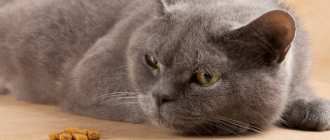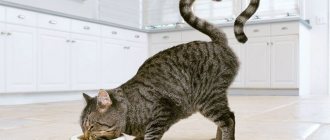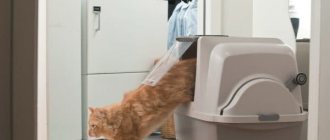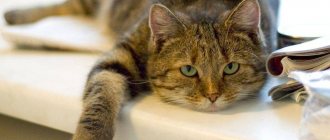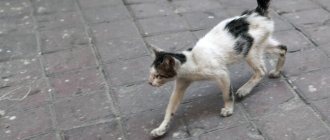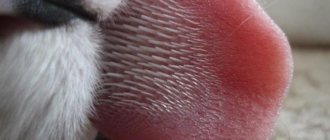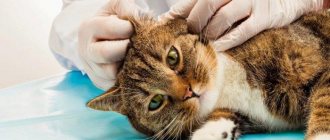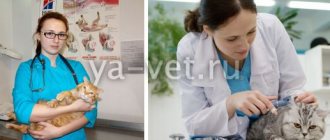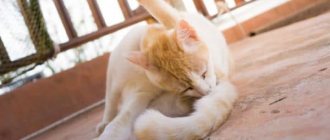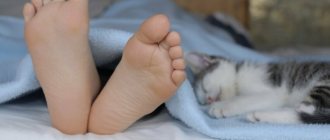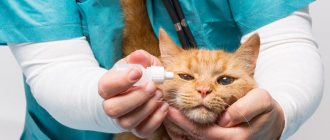Sometimes it happens that a cat refuses food and water. This behavior can be alarming, especially if the pet has been eating well before. The cause can be both harmless provoking factors and serious diseases that require complex treatment. If your pet continues to refuse food and water, this is a rather alarming sign.
- 2 What diseases can cause
2.1 Reasons for refusing food - video - 2.2 When you can’t put off visiting a doctor
- 3.1 What to do if your pet doesn’t eat, doesn’t drink and constantly sleeps
Why doesn't my cat eat or drink for several days?
A pet may refuse food and water for a number of reasons. The most common reason is poor health. This is possible under stress, which is associated with a sudden change in environment, renovations, noisy parties, etc. Cats are very sensitive to any changes, so the body can react in a similar way.
In some cases, the problem is caused by unpalatable food. If there is a sudden change in diet, the pet may not react to this in the best way. Especially if the food is cheap and of poor quality. In this case, the problem can be solved very simply - you need to return to your usual diet.
A stressed cat may not eat or drink for several days.
Kittens may refuse food and water due to gastrointestinal disorders. The fact is that a small pet has a weak immune system, and any error in the diet can provoke digestive disorders, which are accompanied by poor appetite and loose stools. Additional factors: subcutaneous ticks, fleas and other parasitic infections.
Attention! If the pet does not want to eat or drink, then first of all you need to look at the fur and skin, which should be normally clean. Then you need to pay attention to the cat's nose. If it is wet, then the temperature is within normal limits.
A sick animal may refuse food and water during the period of exacerbation of the inflammatory process, as the body fights the pathology. Such abstinence from food often does not exceed several days. Additionally, your pet's body temperature may increase. After the fever disappears, appetite is quickly restored. In this case, it is important to clarify what disease caused the symptoms.
A sick cat is often lethargic and refuses water and food.
An old cat may lose its appetite due to inflammatory diseases of the urinary system. Gradually, the animal accumulates salt crystals in its urine (this is associated with an abundance of sodium in dry food), which provokes the formation of stones that can clog the urinary ducts. An additional reason is inflammation of the gums, since the teeth of an old pet often crumble and fall out, which contributes to the occurrence of periodontitis, gingivitis and other similar pathologies.
Old cats are often susceptible to inflammatory gum disease
One of the common reasons for loss of appetite and refusal to drink water is poisoning. This can happen at any age. A cat can be poisoned by some kind of chemical by licking it from the floor, as well as by poisonous plants, stale food, and insects. Intoxication is often accompanied by refusal of food, water, fever, loose stools and vomiting.
Another reason why your pet suddenly began to refrain from eating could be a foreign body stuck in the throat. At the same time, the animal behaves strangely, hides, vomits, and the cat may also wheeze while trying to push the object out.
Why does my appetite disappear?
There are actually many reasons. But there are three main categories: psychological, natural or health-related.
Problems of the first category can be solved by the owner independently and quickly:
- Dirty bowl. Cats are very clean animals and a dirty bowl or dried food with an unpleasant odor can ruin your pet’s appetite. But this is not the most dangerous thing, because a dirty bowl can cause the development of certain diseases in the animal.
- The need to eat from the same tray with other cats is similar in many ways to the first reason, but there is another point: cats are more independent creatures and not everyone is ready to share their food.
- Changing the feeding conditions (the bowl has been moved) also greatly affects the animal’s psyche; cats value stability very much and react painfully to any changes.
Reluctance to share food or disgust can cause a cat to refuse food
Reference
The norm for fasting while maintaining good health and activity for an adult is considered to be 2-5 days, for a kitten - 1 day.
What diseases can cause
The following diseases can provoke loss of appetite and refusal of water in cats:
- malignant tumors - can be asymptomatic for a long time, most often affecting old animals, which at the same time begin to rapidly lose weight and prefer a sedentary lifestyle;
- renal failure - can occur in a pet at any age, while the cat rarely goes to the toilet, urine is excreted in small quantities;
- helminthic infestations are a common cause of loss of appetite in an animal at any age; in addition, symptoms such as stool disorders, weight loss, hair loss, vomiting, etc. are often present;
- fungal diseases - accompanied by deterioration of appetite, refusal of water, hair loss, skin rashes, itching and a general unsatisfactory condition in which the cat refrains from active games;
- intestinal obstruction - can be the result of stuck hairballs, helminthic infestation, while the pet does not go to the toilet and tries to hide.
Fungal diseases in cats can cause loss of appetite
Cats may refuse food and water during estrus, which is associated with hormonal changes in the body. As a rule, appetite is restored within a few days.
A friend’s cat suddenly lost his appetite and drank very little. At first she thought it had something to do with the extreme heat. Then the cat began to hide and lost a lot of weight. When I came to visit her and called my pet, he came out of hiding. He was terribly thin and could barely sit. Suddenly I discovered a sore on his withers and a lack of hair in this place. She advised me to immediately contact a veterinarian, as I suspected the presence of a tick. I recommend carefully examining your pets if their appetite worsens and they refuse water. Provoking factors are not always as harmless as they may seem at first glance. Now the cat has almost fully recovered, but long-term therapy is still required.
Reasons for refusing food - video
When you can't put off visiting a doctor
If within three days the cat’s appetite is not restored and it refuses to drink, then it is necessary to urgently consult a doctor, as the risk of dehydration is high. It is also important to visit a specialist if your animal has the following symptoms:
- vomit;
- hair loss;
- rash;
- loose stools;
- elevated temperature;
- weakness.
Attention! Owners should be wary if their pet hides all the time and avoids contact. This may indicate a severe pathological process in the body.
Diseases
If your cat has lost his appetite and is lethargic, these may be symptoms of some disease.:
- infections;
- inflammatory processes;
- development of benign or malignant tumors;
- dysfunction of the liver, intestines or stomach;
- oral diseases.
Such pathologies lead to anorexia (complete lack of appetite), which can lead to depletion of the body. Therefore, if your appetite has disappeared for no apparent reason. You should immediately contact a veterinary clinic for examination.
© shutterstock
How and how to help an animal
If a cat refuses food and water, then the first thing to do is take your pet to a veterinarian. It is not possible to make a diagnosis on your own at home, so you need to call a doctor at home or take your pet to the clinic.
If it is impossible to get to the veterinarian in the next 24 hours, then you need to provide the cat with rest. To do this, you should prepare a clean litter; it should not be too soft or too hard. If an animal is hiding, you should not force it out of its hiding place. You can only place a bowl of food and fresh water nearby.
Bowls of water and food should always be available to the animal.
Under no circumstances should you try to give your pet any medications without first consulting a doctor. Otherwise, you can only cause harm and provoke life-threatening consequences.
If the doctor has determined the cause, then you should follow the specialist’s recommendations and give medications according to instructions in the required dosages. This must be done calmly; you must not cause pain to the animal. Before giving medication, the cat needs to be stroked, and the tone of voice should be calm. This way, the pet will tolerate the treatment better, will not resist too much and will recover faster.
Additional recommendations:
- If the cause is stress, then the cat should be left alone for a while. It is advisable to call her to eat in a gentle tone. A calm and quiet environment, the absence of extraneous noise and periodic stroking will help you recover from stress.
- If your pet doesn't like the food, you need to replace it as soon as possible. It is recommended to give preference to balanced foods rather than cheap options containing a lot of harmful additives.
- In case of gastrointestinal upset and poisoning, you can give the animal activated charcoal (500 mg per 1 kg of weight). In this case, the tablet must be crushed and dissolved in 1 tsp. water. It is most convenient to give medicine using a syringe without a needle. It is enough to do this procedure once before seeing a doctor.
- Ticks and fleas are eliminated using special antiparasitic medications. You should not use them on your own; you should first consult your doctor. However, if this is not possible in the near future, and the animal has fleas or a tick is found, you can purchase Bars or Celandine shampoo.
- If the cause is helminthic infestations, then treatment is carried out with the help of anthelmintic drugs. The medication should be given only according to the regimen recommended by the doctor. Otherwise, larvae may remain, which will provoke a relapse.
- To alleviate the condition of an animal with gum inflammation, you can use a solution of Miramistin or potassium permanganate. It is necessary to treat the gums using a cotton pad and the selected product. This needs to be done 2 times a day. Do not press on problem areas.
A weak solution of potassium permanganate can be used to treat inflamed gums
What to do if your pet doesn’t eat, doesn’t drink and constantly sleeps
If an animal does not eat or drink, and also sleeps constantly, then this is an alarming signal of serious health problems. However, in extremely rare cases this is associated with stress. In this case, the pet should be left alone and allowed to rest. There is no danger in inactivity after stress. If the animal is lethargic, does not eat or drink for another reason, then postponing a visit to the doctor is dangerous, since with a serious pathology the cat may die.
Some recommendations that will help you hold out until the doctor arrives:
- It is necessary to ensure that fresh air enters the room.
- Do not disturb the pet. If there are other animals in the house, then for safety reasons it is better to isolate them from contact with the sick cat.
- Make sure the water in the bowl is always clean.
- If there is a special medicinal herb for cats in the house, which breeders often grow in pots, then you can pick a little and put it next to your pet. If desired, the animal can be treated with such a safe remedy.
Attention! If a cat does not drink for more than 24 hours, it can cause death. In this case, water must be injected forcibly using a thin syringe without a needle, gradually pouring it into the mouth.
How to help a kitten
If the kitten does not eat anything or drink water, then first of all you need to pay attention to the nature of the food. Small pets need special soft food. It is impossible to give a kitten food intended for adult animals, since the gastrointestinal tract of babies is still very weak. Long-term refusal of water is dangerous, so you can give your pet water using a pipette. Every hour you need to give water forcibly. The liquid should be administered in small quantities - one pipette at a time is enough.
Giving your kitten water using a pipette will prevent dehydration
In addition, the kitten should be carefully examined for rashes, sores and fleas. Particular attention should be paid to the withers and ears. If everything is clean, then most likely the problem lies in the functioning of the internal organs, which can only be determined in a clinical setting.
Attention! If a kitten has a sore in the withers area, under no circumstances should you burn it with iodine or brilliant green. This may indicate the presence of a mite or lichen. In this case, you need to undergo the necessary tests and isolate children and other animals from contact with the kitten until complete recovery.
Parasites
Parasites can appear in cats at any time - even domestic cats are not protected from them. There are only three types of parasites - cutaneous (external), subcutaneous and internal (intestinal).
Skin (fleas, lice) generally do not affect the internal state of your pet, while subcutaneous mites affect your pet’s appetite. With this disease, the cat's immunity decreases and inflammation appears. Carefully examine the withers, face and ear area; if you see redness, weeping wounds, or baldness, then perhaps it is a subcutaneous mite.
Internal parasites, they can be seen visually when examining the animal’s feces, but there is also a list of symptoms, in addition to decreased appetite, that you need to pay attention to: vomiting, diarrhea, elevated body temperature, sudden weight loss, itching in the anus (this can be determined by behavior ).
These parasites pose a danger not only to your pet, but there is a risk that you will become infected. Therefore, it is worth carrying out anthelmintic prophylaxis, washing your hands after contact with an animal and cleaning the tray using gloves.
Diseases of internal organs
One of the main reasons for your pet's internal organs, as we said, is the natural aging of your cat, but there are other reasons:
- Respiratory diseases (as a rule, they arise as a result of a previous cold, hypothermia, or prolonged exposure of the animal to damp);
- Diseases of the digestive system (the occurrence of these diseases is significantly influenced by a violation of the diet, poor quality of food, the environment in which the cat eats, how often the cat’s diet changes, the living conditions of the animal, the pet’s predisposition to certain infectious and invasive diseases);
- Diseases caused by metabolic disorders (Such diseases occur when there is insufficient intake of vitamins and minerals into the body, or when they are poorly absorbed. In addition, diseases of this group arise as a result of disruption of the endocrine glands);
- Infectious diseases (they are caused by viruses transmitted to a healthy animal from a virus carrier through blood, saliva, and injured mucous membranes).
Unfortunately, cats cannot speak our language to communicate where they are hurting.
Prevention measures
Prevention rules that will help avoid problems:
- Make sure water and food bowls are always clean.
- Include only high-quality food in your pet's diet.
- Try not to expose your cat to stressful situations.
- Brush the coat regularly. This must be done using a furminator. This procedure will prevent the accumulation of hair in the cat’s gastrointestinal tract after licking.
- Eliminate the presence of cockroaches in the house, which can carry serious infections.
- Protect your pet from contact with street animals.
- Regularly wet-clean the floor.
- Do not give your cat any medications without consulting a doctor.
- Deworm your pet once every 4–6 months.
To protect your animal from a number of diseases, it is recommended to keep outdoor shoes in the closet. This is important to prevent the cat from coming into contact with bacteria that can easily be carried home on the soles.
If a cat loses its appetite and feels unsatisfactory, then there is no need to try to cure it at home. If the provoking factor is not serious and does not pose a threat to life, then the pet will recover in the next 24–48 hours. When this does not happen, you should immediately consult a doctor.
Nervous system disorders
This is another common reason why a cat has no appetite. Cats and cats are quite sensitive animals. They react to almost any significant change in lifestyle, and sometimes the pet’s reaction can be unpredictable. Obviously, some situations are likely to cause stress, which explains why the appetite has disappeared:
- Moving to a new place. For example, a kitten that has been separated from a cat and settled in a new home is at risk.
- Long, hours-long journey.
- The arrival of a new pet.
- Birth of a child.
- Dangerous situations (for example, a fight with a cat, the threat of a dog attack, etc.).
- Insufficient attention from the owner, conflict atmosphere.
- Long-term absence of the owner (it is known that cats very often become attached to a specific person and do not like change).
In rare cases, cats lose their appetite even due to harmless reasons - changing the bowl, changing the location of the toilet or rest area. Therefore, it is worth analyzing whether there were any significant changes the day before. If the reason for loss of appetite is related to stress, it is necessary to give your pet as much attention as possible.
Feeding tips
If all possible causes have been excluded, and the examination failed to identify the disease, you can try changing the menu. Some cats are picky and prefer only certain types of food. However, you should not feed the animal only delicacies, otherwise it will become capricious and refuse normal food, and this will only worsen the problem.
If you give your pet dry food, change the brand. Avoid economy and premium diets: they contain flavoring additives, after which it becomes difficult to switch the kitten to other products.
To improve the aroma of food, you can use special seasonings for cats. They are added to natural products. If your pet eats dry food, you can try mixing it with a small amount of spider sauce: this will give it an appetizing smell.
If your kitten has free access to food, try limiting it. Under conditions of deficiency, appetite increases. You can deliberately reduce the portion to create an artificial shortage of food, then gradually increase the amount of food to the required amount. If the kitten begins to malnourish again, go back a step.
